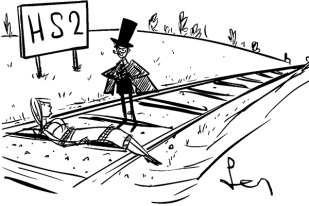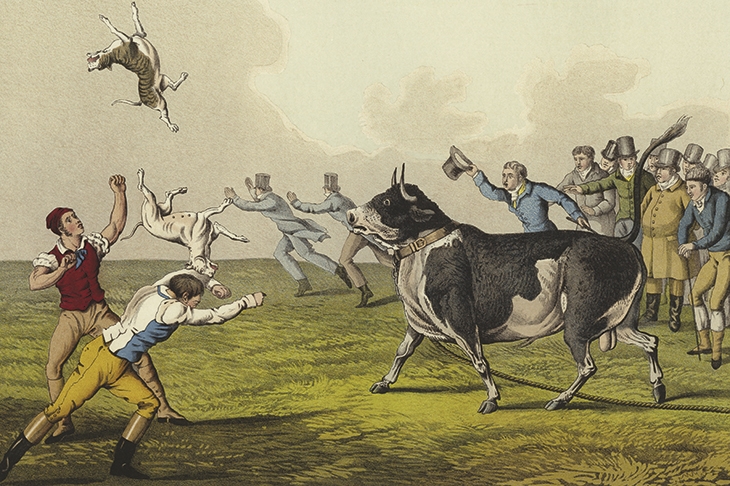The English cannot be understood without some appreciation of their attachment to their games, and yet this is an area of their story often overlooked by historians. Or perhaps it is simply considered beneath their interest. This is the central message of Robert Colls’s superb account of England viewed through the medium of its sports and pastimes. Sport is ‘woven into almost everything else we do’ and it is about something much larger than merely chasing or hitting a ball, for it is bound up with
playing the game, enjoying the land, sensing the liberty, respecting contestation, valuing home, showing a bit of heart, recognising it in others, knowing that not everyone is political, or has to be, that not everyone knows what they think or (whichever comes first) how to say it, and understanding above all that sport is an enduring part of our liberty.
There is a lot in that, and much of it is unpacked in a book that romps from the hunting fields of Leicestershire to the development of modern football and the end of the maximum wage. On the way we encounter prize-fights, bull-baiting and plenty of anarchy.
What emerges from the scrum is a picture of a disputatious, stroppy people keenly aware of, and determined to protect, their ancient prerogatives. If doing so sets them against authority, then so much the very better. There may be humbug aplenty here, but it is humbug accompanied by the roast beef of old England and therefore, in the end, at least it is proper humbug.
For there have always been scolds — in 1911, Birmingham city council prosecuted 132 boys for playing football in the street — and Colls, who has a winning line of dry humour, is instinctively on the side of the sportsmen. Critically, this is more complex than taking the side of the working man against his social superiors. The rights of the gentry to pursue their foxes were little different to the ordinary man’s self-proclaimed right to poach fish and deer and anything else he could catch. Each asserted a land-based freedom in the face of ever-encroaching authority and bien pensant disapproval.

Custom is the bedrock of England. As Colls puts it:
When the English, therefore, said they did something because ‘they’ (meaning they and their forebears) had always done it, and it was their liberty to do it, they were reflecting not only their history but a constitution which Judge Blackstone (the great teacher of laws) himself described as nothing more than a set of customs.
Even if this meant baiting and torturing a bull until such point as it expired, as was the custom each November in the Lincolnshire village of Stamford until the authorities successfully suppressed the festival in 1839, then so be it. At that point, it wasn’t just the bulls that died: a little bit of Stamford did too.
The English have long enjoyed a spot of ultra-violence, whether in the field, the ring or the capitals of Europe
Horrific, at least to modern sensibilities; but this is a history soaked in guts and ‘claret’. The English have long enjoyed a spot of ultra-violence, whether in the field or the ring or, it does not seem much of a stretch to say, in the capitals of Europe as and when the England football team is paying a visit. They riot because they can and because a riot is a liberty. Free will, you see, and if it appals all the right people, then good. For ‘the English civil war was a sporting as well as a religious war, and it did not end in 1660’. Puritanism waged war on the parish — Colls is elegiac on this and, indeed, much else — and, consequently ‘King James’s Book of Sports deliberately endorsed Sunday as a day of sport’. Much good it did him and his successors: ‘In 1643, Parliament hanged the Book of Sports in public.’
This is much more than a history of sport; it is really an alternative history of England itself. Colls ranges wherever his fancy takes him. So this book encompasses everything from public schools to Methodism, via enclosure and the meaning of England’s love affair with equestrian painting. There are bold, imaginative leaps too. Thus: ‘It is possible to see the Durham Miners Gala and Northern Ireland’s Orange Parades as two of the 19th century’s most long-lasting popular constitutional performances.’ Each is a form of sport; each is a declaration of meaning accompanied by a certain measure of defiance. This book is full of moments that pull you up short and make you think.
‘Patriotism, in these circumstances,’ Colls writes, ‘was not something imposed from above.’ In this, as in so much else, England really was different from much of continental Europe. It may seem a curious thing to say, but any Remainer who reads this terrific book will understand Brexit a little bit more fully than they did previously.
Other games have rules, but cricket has laws. As Mike Brearley notes in Spirit of Cricket, ‘the game has been a social cement in England’, and that — which is something Colls appreciates too — has given the summer game a classless identity in a land otherwise often riven by class. It makes cricket distinctive and unusual and worth preserving for that reason alone. Cricket helped make England a civilised country, and then helped keep it that way. After all, as G.M. Trevelyan suggested, not entirely in jest, if the French aristocracy had played cricket with their peasants, the Revolution might have been deemed unnecessary.
For Brearley, ‘the spirit of cricket — like “truth” or “goodness” or “the rule of law” — alludes to an ideal, an aspiration, but it also recognises a reality’. It can live in shades of grey, but you know it when you see it, or feel it, or show it.
Brearley, one of the few test cricketers with a second career as a psychoanalyst, is the soul of moderation and perspective. ‘Let’s expect a lot’ from the game — among which is the duty to remember it is a game — ‘but not too much’. So
don’t hype cricket up into something elevated, a golden calf, or imagine that it is too special. If we do, we risk being left with nothing… or with something flat and boring, dull as ditchwater: a drab list of solemn platitudes.
Sport, like life, should be a raucous thing. It is not, as the Liverpool manager Bill Shankly once put it, half tongue-in-cheek, a matter of life and death, for ‘it’s much more important than that’. Or, rather, without sport — or art — existence is only a matter of life and death. ‘And yet, and yet. Cricket is special,’ Brearley concludes, ‘and our better selves can prevail.’
I think Ian Ridley would agree with that. Cricket is the McGuffin for his book The Breath of Sadness, which is really an account and exploration of grief. Following the death from cancer of his wife — the sportswriter Vikki Orvice — Ridley descended into darkness. ‘It would be a fanciful overstatement to suggest that cricket saved me that year after Vikki passed,’ he writes; but a summer spent amid the ‘gentle competitiveness’ of the County Championship certainly helped him, as he puts it, to ‘recover from grief’.
Ridley, an accomplished sportswriter himself, is wincingly honest, and the result is a moving, perceptive, book that is not really about cricket but, instead, is a love song. Like all the best such tunes it is a sad one, yet also, in the end, life-enhancing.







Comments